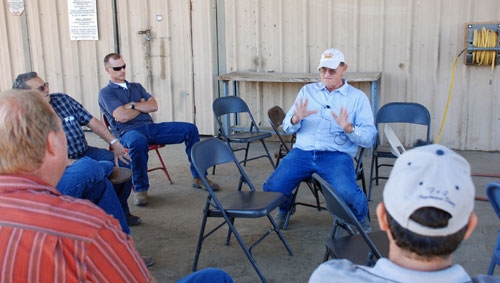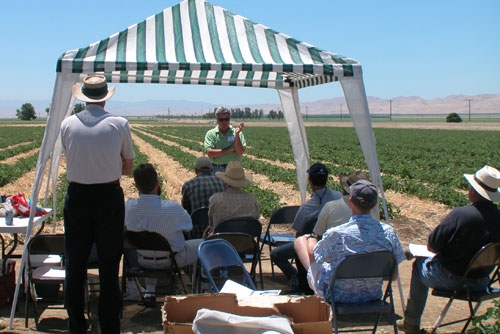In 2005, the University of California and NRCS Conservation Tillage Workgroup established the Conservation Tillage Farmer Innovator Award as a means for providing greater visibility to CT pioneers in California. The criteria for this award are demonstrated innovation and leadership in the development, refinement and use of conservation tillage systems within the California crop production environment. Nominations are received and carefully reviewed by a workgroup panel and recipients are announced in annual meetings held in both Five Points and Davis.
The recipients of the 2011 CT Farmer Innovator Awards are Michael Crowell of Turlock, Fred Leavitt and Steve Fortner of Firebaugh, and Fritz Durst of Zamora in Yolo County.

Michael began his no-till work very strategically. Recognizing that the edges of his field presented compaction issues, he ripped them before starting his no-till planting systems. He also took part in the 2007 CT Workgroup Tour back to Nebraska, South Dakota, Wyoming and Colorado with his wife, Jonette, and has been a very tenacious and supportive participant and mentor for other California farmers and Workgroup members interested in CT.
The thing that sets Michael apart from others is his sheer persistence and commitment to no-till He is, as he has said, committed to making it work and the successes he has had with it to date bear well for his being able to continue down the no-till path. As he mentioned to a UC Davis student tour group, he “loves the dirt,” and loves working on ways to improve his soils.

The essence of Sun Pacific’s CT system is the use of off-season barley or triticale cover crops, strip-tillage ahead of tomato transplanting, and subsurface drip irrigation. Together, these practices have created an economically viable and resource-conserving system that is simply state-of-the-art. They have hosted several CT Workgroup events at their Firebaugh farm fields and recently, in July of 2010, took three tomato farmers from up in the Tracy, Calif., area on a full tour of Sun Pacific’s fields.
Steve and Fred were THE original pioneers in terms of trying the strip-till cover crop tomato system. Their actual first efforts with this system occurred in a small section of one of their Firebaugh fresh market tomato fields back in 2003. This initial attempt was a very bold initiative on their part and it involved considerable planning, careful observation and trouble shooting. They worked on refining the basic strip-tiller and were the first in California to attempt to use a rotary tiller model that they fabricated themselves. They then were also the first to use a ground-driver “Yetter” strip-tiller at their farm.
Their tomato fields are not only typically quite immaculate, but also extremely productive.

Fritz is truly a conservation tillage pioneer in an area of the State that in the early 1980’s was subject to massive sheet and rill erosion that resulted from conventional tillage practices that relied on moldboard plowing and left little or no residues to protect the soil from the impacts of rain.
Fritz has always enjoyed the challenges of agriculture and began accompanying his father around their ranchland and fields by age five. Not long after graduating from UC Davis with a degree in agricultural economics, Fritz and his father turned their attention toward the problem of persistent soil erosion occurring on the uplands of the Capay Hills and the foothills near Dunnigan. They investigated no-till techniques for their small grain crops that involved planting directly into the residue of the previous crop.
The most immediate benefit Fritz realized was a significant reduction in soil erosion. In 1985, after one year of no-till wheat production Durst reported a reduction in annual soil loss from six tons/acre using conventional tillage to two tons/acre in his no-till fields. Additionally, the large six foot deep gullies that appeared after winter storms were not seen the year following their change to no-till and he also has been quoted as not having seen one erosion gully in his wheat and barley fields since he quit tilling the soil. During the next few years, Fritz reported on his experiences at several no-till workshops, and received the RCD “Cooperator of the Year Award” in 1986 for being a pioneer of no-till cultivation in Yolo County.
Awards to Crowell, Fortner and Leavitt were presented at the Workgroup’s Twilight CT and Overhead Irrigation event on Sept. 8 in Five Points and Durst was recognized at a meeting in Davis on Dec. 16. The pioneering accomplishments of each of these innovators make them quite fitting recipients of this year’s CT Farmer Innovator Awards.
More information and photos are available from Jeff Mitchell at mitchell@uckac.edu or (559) 303-9689.